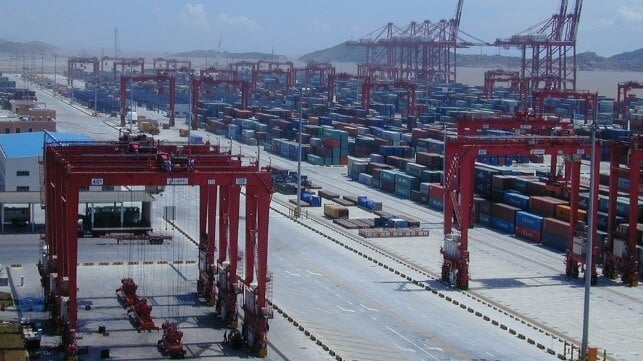China's Exports Plummeted Nine Percent in November

The latest round of monthly data from China's customs agency shows that the nation is experiencing its biggest trade slowdown since the start of the pandemic two years ago.
China's customs bureau reports that in November, the nation's exports fell nearly nine percent (by value), about two to four times as much as analysts had expected. The drop reflects weakening global demand for Chinese goods, as inflation and rising interest rates cut into consumers' ability to spend on discretionary purchases. Meanwhile, China's imports were down by nearly 11 percent. Stock markets responded to apparent signs of economic slowdown: The NASDAQ and S&P 500 both declined Wednesday, and Hong Kong's Hang Seng index fell by more than three percent.
The trade data reflects what container-freight observers have seen on the water and in port: blanked sailings, underfilled vessels, and terminals with ample capacity. According to Drewry, carriers have canceled about 13 percent of the sailings scheduled in December, and reports suggest that many boxships have been departing China substantially less than full. Freight rates have plummeted accordingly, and the price to ship a container from Shanghai to the U.S. West Coast has fallen 90 percent year-on-year.

that matters most
Get the latest maritime news delivered to your inbox daily.
China's strict COVID-19 restrictions have played a role in the downturn by cutting into domestic demand and disrupting supply chains, from the factory floor to the seaport. But that may be ending soon. An endless series of rolling lockdowns have rocked public confidence in the administration of Chinese President Xi Jinping, culminating in a round of rare protests in November. In what political analysts describe as a coordinated reaction to public pressure, China has begun to loosen up on its strict "zero COVID" policy. Last week, big manufacturing cities began to ease testing rules and movement restrictions. Neighborhoods in Shanghai and Guangzhou that were under lockdown have been released, and city officials have begun removing the COVID test booths that were permanent fixtures in central squares.
This portends well for economic activity and trade, except for one factor: China's relatively weak vaccination campaign, which has left many (especially the elderly) underprotected. The reopening will likely be accompanied by a spike in infections and fatalities, which could have an impact on the nation's return to normalcy, according to epidemiologists. A study published in Nature Medicine by researchers at Fudan University predicted up to 5.1 million hospitalizations and 1.6 million fatalities if China's COVID-19 restrictions are lifted quickly.
